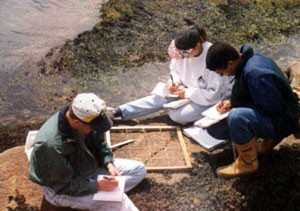Teaching & Research

y research focuses upon the application of complexity theory to marine food webs using a qualitative network technique, loop analysis.  Current ecological and evolutionary research questions are:
(1)   Do marine food webs exhibit anticipation, emergence, and self-organization?
(2)   What are the characteristics of biologically-reasonable food webs and ecological skeletons?
(3)  How do trophic escalades work, and why are they more prevalent than trophic cascades?
(4) How do recent developments in in population-level (niche construction) and ecosystem-level     ecology (food web functional dynamics and ecosystem chimeras) and the Biocomplexity Revolution challenge standard evolutionary theory?
     Classes in which Pat currently teaches:
- Communities and Ecosystems
- Environmental Impact Assessment
- Sustainability and Complexity
|
|
I presently teach three undergraduate classes.  They are taught from a systems perspective emphasizing inter-disciplinary and trans-disciplinary thinking and analysis. I also periodically teach a graduate module on ecological complexity.
I hold cross-appointments in the Departments of International Development Studies and Programs in Environmental Science and Marine Affairs.  I have been an EIA practitioner in Canada and abroad on dozens of environmental impact assessments and helped harmonize EIA requirements in Bangladesh, Nicaragua, and elsewhere and in assessing oil developments, electrical-generation facilities, mining operations, transportation projects, national park developments, military activities, industrial facilities, and sewage facilities.
In 2012, I began coordinating the Environmental Impact Assessment Certificate that is available for undergraduates majoring in Biology, Marine Biology, Earth Sciences, Geography, and Oceanography in the Faculty of Science as well as in International Development Studies in the Faculty of Arts and Social Sciences and sustainability students in the College of Sustainability.
|



